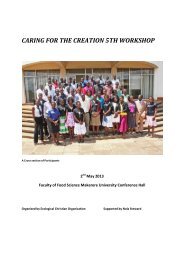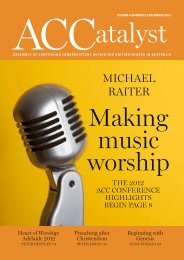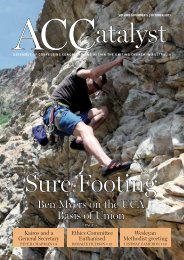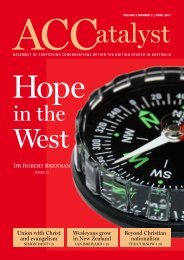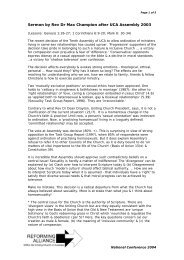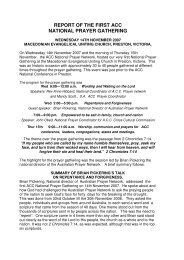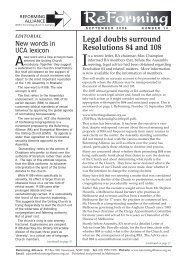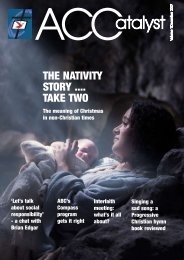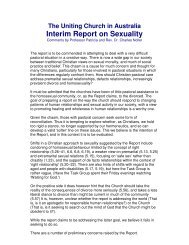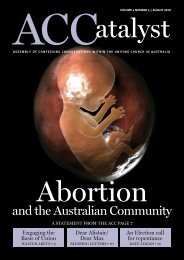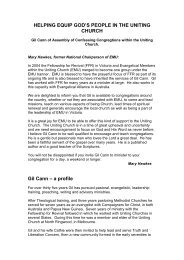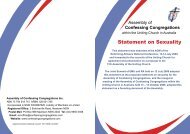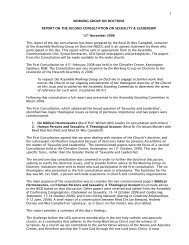where are we now? - Assembly of Confessing Congregations
where are we now? - Assembly of Confessing Congregations
where are we now? - Assembly of Confessing Congregations
You also want an ePaper? Increase the reach of your titles
YUMPU automatically turns print PDFs into web optimized ePapers that Google loves.
Like all UC ministers, the pastors at WIC <strong>are</strong> all required to attend Sexual Misconduct Aw<strong>are</strong>ness<br />
seminars. I was supposed to attend one this year, but I opted out on several grounds. First, I have<br />
personally written and taught on this subject for years; second, I have had to deal with ministers<br />
concerning this issue more than once in the course <strong>of</strong> my ministry; third, I am about to step down<br />
from leadership at the end <strong>of</strong> the year anyway; but, fourth, I would not undertake the course on<br />
principle. How can a Church that allows parishes and Presbyteries to approve homosexual practice<br />
among ministers have credibility on the subject <strong>of</strong> sexual misconduct?<br />
It is <strong>of</strong> interest, for example, to examine the definition <strong>of</strong> sexual misconduct in the Uniting Church<br />
Regulations (7.7.4) <strong>where</strong> it is defined as behaviour including sexual harassment, sexual assault,<br />
sexual conduct prohibited by criminal law, sexualisation <strong>of</strong> a pastoral relationship and ‘grave sexual<br />
misconduct unworthy <strong>of</strong> a Minister’. Neither adultery nor homosexual behaviour <strong>are</strong> mentioned,<br />
although both <strong>are</strong> specifically named in Scripture as being sinful (Matthew 5:27-30; 19:9; 1<br />
Corinthians 6:9-11). 8<br />
The phrase ‘grave sexual conduct unworthy <strong>of</strong> a minister’ may be seen to cover these, but it does<br />
not do so sufficiently. In the absence <strong>of</strong> any clear statement that homosexual behaviour is wrong,<br />
arguments have been mounted that it is in fact acceptable. So Mary Jo Osterman argues that<br />
Christian freedom permits such a view. 9 She goes on to suggest that Paul’s reference to homosexual<br />
practice in Romans 1:26-27 had nothing to do with non-exploitative, committed and monogamous<br />
same-sex relationships, <strong>of</strong> which he had no understanding. 10 Of course, this argument can be readily<br />
challenged. The writings <strong>of</strong> Plato, for example, talk openly <strong>of</strong> exactly this kind <strong>of</strong> homosexual<br />
behaviour. 11<br />
One further example. At a Presbytery meeting three or four years ago, one <strong>of</strong> the member s turned<br />
up blind drunk. He could hardly stand and could not walk without assistance. Perhaps the Church<br />
cannot be blamed for this. But to my k<strong>now</strong>ledge, on subsequent occasions, the same man<br />
continued to attend Presbytery. I still find this an incredible set <strong>of</strong> circumstances. I wonder how John<br />
Wesley might have dealt with it.<br />
The Basis <strong>of</strong> Union refers to governance in the Church through inter-related councils (#15) – an<br />
approach <strong>of</strong> which the Church is justly proud. An outcome <strong>of</strong> this – and <strong>of</strong> the general ‘uniting’<br />
approach <strong>of</strong> the Church – has been decision-making by consensus. While this as an ideal can only be<br />
admired, in practice, it can easily hand over leadership to vocal minorities. Some 95% <strong>of</strong> people<br />
might approve a certain action, but the %5 may be given a disproportionate amount <strong>of</strong> time to plead<br />
their cause and if they do not choose to go along with the majority, the whole process may be<br />
brought to a halt and nothing happens. The result? Minority rule. I have listened in vain for any<br />
suggestion <strong>of</strong> apostolic or prophetic leadership.<br />
8 It is fair to say that other documents <strong>of</strong> the Church <strong>are</strong> more specific on these issues, but these comments <strong>are</strong><br />
correct as applied to the definition <strong>of</strong> sexual misconduct in the Regulations.<br />
9 M.J.Osterman, Claiming the Promise Chicago: Reconciling Congregation Program 1997:14. Although this is<br />
not a UC publication, it was available for sale at the NSW UC Synod in 2005.<br />
10 Osterman, 1997:18, 24.<br />
11 B.Jo<strong>we</strong>tt (tr), Plato, Phaedrus Chicago: Encyclopaedia Britannica 1952:117; B.Jo<strong>we</strong>tt (tr), Symposium<br />
Chicago: Encyclopaedia Britannica 1952:149-173.



